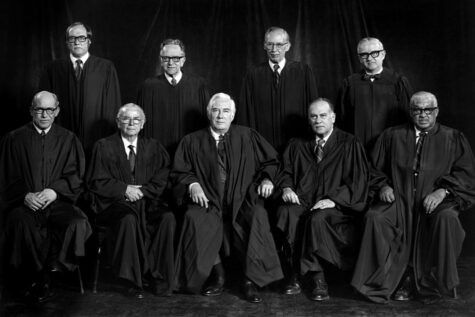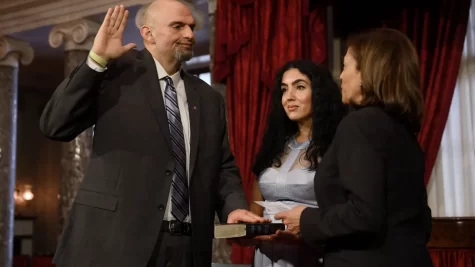Voter Suppression Efforts Widespread in America
October 25, 2018
Several candidates involved in the midterm elections have been connected to modern day voter suppression in an attempt to manipulate election outcomes.
Many current examples of the GOP cracking down on voter fraud have been linked to the Party’s alleged suppression of votes to win elections.
Democratic National Chairman Tom Perez made the connection between the Republican-led fight against suspected voter fraud and voter suppression in an editorial for CNBC. Perez wrote, “[…] the Republican Party continues to push this ‘voter fraud’ myth and use voter suppression tactics any chance they get.”
These tactics work by supplying a cover story revolving around voter fraud prevention. The apparent prevention tactic is truly being used to work against a specific group of people. One of the most classic examples of this tactic in use are the Jim Crow laws. These laws included poll taxes, literacy tests, and grandfather clauses created to prevent African Americans from voting.
Perez goes further and said Donald Trump and other members of the Republican Party are attempting to connect the idea of voter fraud to illegal immigrants voting. Perez said, “President Trump repeatedly made the false claim that three million undocumented immigrants voted in the 2016 election.”
Perez isn’t the only one seeing a problem.
On August 31, Trump’s Justice Department issued subpoenas demanding millions of records about individual North Carolina voters by September 25. According to the New York Times, these subpoenas were believed to have been made on behalf of Immigration and Customs Enforcement (ICE). Despite this, the representatives of ICE and Justice Department officials involved declined to comment.
“With just two months to go before the midterms, the subpoenas threatened to sow chaos in the state’s election machinery, while renewing the Trump administration’s repeatedly discredited claims of widespread voting by illegal immigrants,” according to the New York Times.
Because of the fierce backlash the administration faced, the US Attorney’s office chose to change the deadline of their request to January.
Perez pointed to this incident in his editorial writing, “[…] such requests discourage Americans from exercising their constitutional right to vote.” Perez also said the subpoenas were an obvious attempt at voter suppression.
Another recent example of heavy-handed voter suppression happened in Georgia. In Jefferson County, Georgia, a group of African American senior citizens were forced off of a bus taking them to vote early, according to Newsweek. In Georgia, early in-person absentee voting began on October 15 this year.
“Jefferson County’s administrator said Tuesday that the county government considered the event at the senior center ‘political activity,’ which isn’t allowed during county-sponsored events,” according to the Atlanta Journal-Constitution.
Black Voters Matter, the nonpartisan group that arranged the activity, believes the officials stopped the bus because African Americans typically vote Democratic.
LaTosha Brown, a co-founder of Black Voters Matter, said that the organization had received permission for the trip in advance.
This adds context to a previous question of voter suppression in Georgia. In this case, 53,000 predominantly African American voter registration applications were on hold, according to The Washington Post.
“Democratic candidate Stacey Abrams and voting rights groups are blaming her opponent in the race, Secretary of State Brian Kemp, over the hold up,” according to The Hill.
Kemp’s office oversees elections in Georgia, and Abrams believes he has enacted policies to suppress minority votes.
Kemp denies the allegations, saying that his opponent and liberals are playing political games.
Pennsylvania is not entirely free from voter suppression either, according to Allied Progress.
Most recently, Pennsylvania voters outside of the country are unable to get access to their absentee ballots, according to The Philly Inquirer. The article says that the website is blocked to thousands of PA voters currently abroad.
Before PA’s relatively recent redistricting, a fairly obviously gerrymandered district map was being used, according to the New York Times. This gerrymandered map was in place to give Republicans an advantage in Pennsylvania.
A lesser known example in Pennsylvania was reported on by Allied Progress, a consumer watchdog organization and a project of the New Venture Fund, a left-of-center funding organization. They found “[…] during the summer leading up to the 2012 presidential election […] the state’s then house majority leader Mike Turzai bragged at a Republican meeting that the Keystone State’s new voter ID law was ‘going to allow Governor Romney to win the state of Pennsylvania.’”
The article went on to say that voter suppression laws affect minority voters, such as senior citizens, the disabled, and low-income citizens, more than they effect majority voters. Examples of laws like this are needing to show identification to vote and having residents show proof of their citizenship.
Similarities can be drawn between modern voter suppression allegations and those that took place in the Jim Crow era, according to The Atlantic.
As with the Jim Crow laws, many current legislation attempting to address voter fraud is impacting minorities. This is seen most obviously with voter identification requirements. It is also shown with far out examples such as Georgia holding on to voter registration forms only a month from the election.
Examples of the US government limiting who is allowed to vote go back to the very founding of the country.
When America was first founded, only white male property owners were even allowed to vote. This changed slowly as civil rights advanced.
Major additions to America’s voters included males of all races gaining the right to vote with the 15th Amendment to the American Constitution. Another major addition came with the 19th Amendment, which granted women’s suffrage.
Despite America’s several advances, many roadblocks remained in the path of these minorities. These were some of the earliest examples of voter suppression.
According to a Dallas News editorial, voter suppression is commonly believed to have been eradicated with the passing of the 24th Amendment and the Voting Rights Act of 1965.
However, former vice president Joe Biden said in an interview with CBS News, “Absolutely, positively, without question [voter suppression is ongoing in the United States].”



